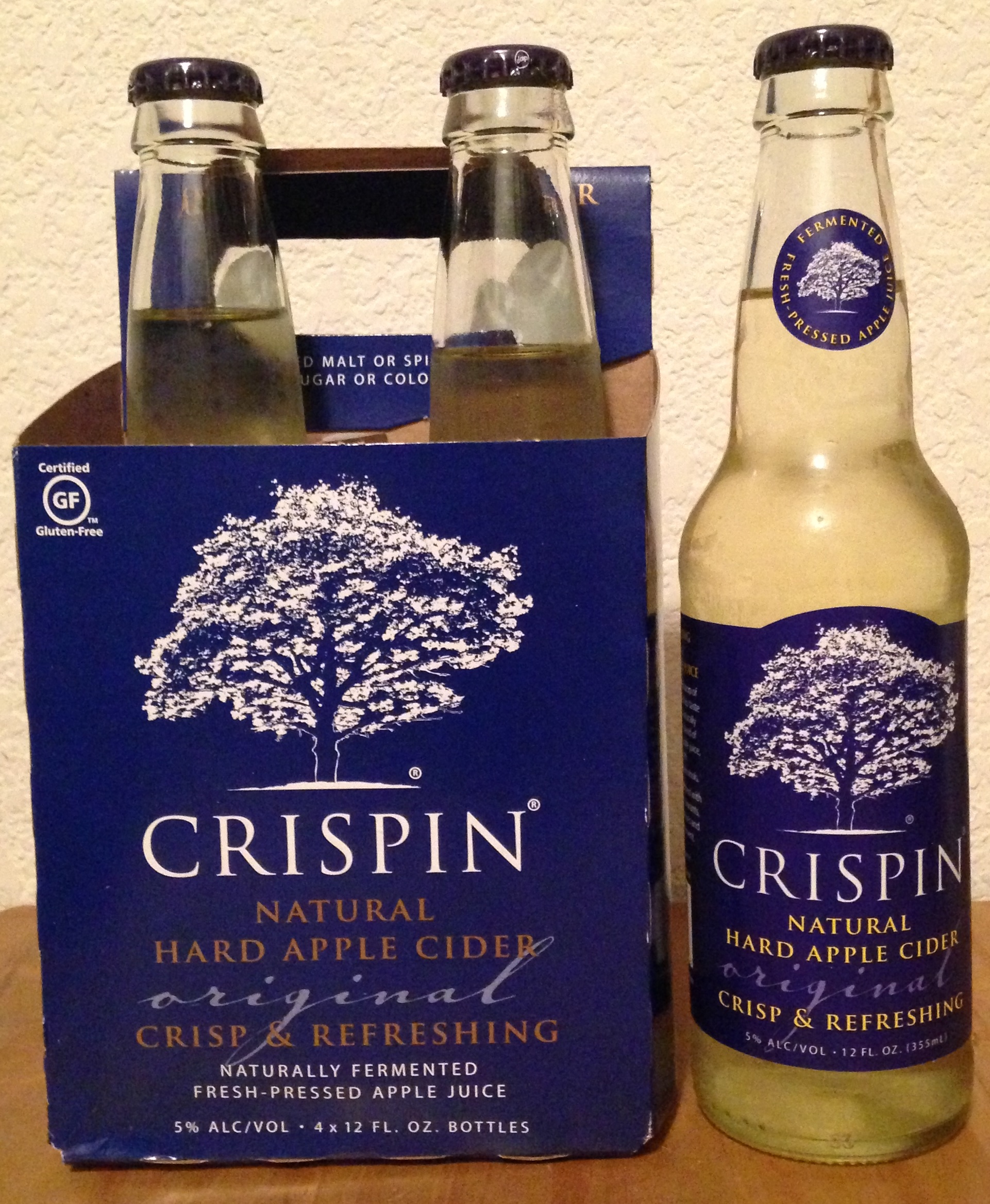Hard Cider Review: Crispin Natural Hard Apple Cider

I intended this post to be a simple review of Crispin’s flagship product, a hard apple cider which is intentionally drier (i.e., contains less sugar) than most commercial ciders on the market. And that’s what it starts with: a review. But when I started looking into the company’s history, I ended up going down a rabbit hole, complete with craft brewers-vs-big brewers intrigue and purist-cidermaking-vs-commercial-shortcuts elements. Interested? Read on…
Crispin Natural Hard Apple Cider (Original) is a dry, American hard apple cider produced by Crispin Cider Company of California (or what appears to be Crispin Cider Company…more on that later). It has a decent tannic crispness to it—or at least the low level of sugar in it allows the natural tannins to come through—and a low level of tartness compared to other ciders I’ve tried. It’s consistent and tasty, if a little spendy for mass-produced cider at $9 for a 4-pack of 12 oz bottles, but it’s good—a whole lot better than, say, the syrupy-sweet, slightly chemical mess that is Woodchuck.
They primarily use Granny Smith, Golden Delicious, and Washington apples from Laos and Utah—none of which, to my knowledge, have much of the bitterness and/or tannins that make for a good hard cider. Yet the flavor is there, so I’m guessing that they are getting creative in what they add to the mix. The bottle lists the ingredients as:
- Hard Apple Cider
- Filtered Water
- Apple Juice Concentrate (back sweetener)
- Apple Essence
- Malic Acid
- Sulfites
Of these, the apple essence stands out as an area where they could be adding bittersweet and bittersharp elements through concentrate made from those types of cider apples. If they do this, and if so, how they’re obtaining it, I don’t know, but I’m reasonably sure that I would not get their results if I used Granny, Golden, and Washington apples—I suspect it would be tart and thin with very little roundness or tannins. Malic acid occurs naturally in apples and makes newly-fermented cider taste very tart, but breaks down over time to make the cider much more palatable. This is why I recommend aging cider for at least a few months (ideally, 4-6 months) after bottling before drinking it…it’s drinkable within several weeks, but it’s well worth waiting. The addition of that is a bit of a mystery as well, unless their base apples simply aren’t acidic enough at the beginning of the process.
Clearly, there is some industrial alchemy going on with the big cider makers that allows them to produce on a large scale using a supply of apples that otherwise isn’t great for cider. To some degree, this is probably a necessity—there simply aren’t enough cider apples in cultivation in the U.S., whereas there are a ton of mass-produced table and dessert apples. I’d like to see that change, at least to the point where there are enough local cider apples grown that home and craft cider producers have the choice to produce it without additional chemical manipulation.
Crispin also produces Browns Lane, a cider line that is made from traditional, bittersweet cider apples as well—haven’t tried this yet but it’s on my list; if I find it to be noteworthy when I get to it, I’ll let you know.
History:
Let me open this section with a recommendation: If you are visiting the website of a company which produces a craft beverage, look for the About Us or Company Info section—if they are independently-owned, they will proudly display this somewhere. If that information is nowhere to be found, they are likely now owned by a giant conglomerate who wants you to think they’re still a small, private company. Beverages in this category are labeled by the Brewers Association as ‘crafty‘–not actually ‘craft’ in the sense of small, independently-produced, in that they are being craftily–deceptively–portrayed as such.
So it was with Crispin, whose website annoyingly omitted history or ownership references.
Here’s the basic history as I was able to piece it together:
- 2008: Crispin Cider Company is founded in MN by Joe Heron, who was looking to make a drier cider than what was on the market at the time
- 2010: Crispin buys a competitor, Fox Barrel and moved its HQ to CA. Grew 200% in 2011 (vs. 26% for the cider industry)
- 2012: MillerCoors buys Crispin for an undisclosed sum…somewhere ‘under $100 million‘ is the closest to a figure I found
Now, for all my annoyance with these stealth acquisition trends—and as lukewarm as I am about MillerCoors—in this case I still like the Crispin product. I’ll definitely choose local product over it, and I’ll never have much in the way of brand loyalty to a company who doesn’t even want me to know that the product I’m consuming is theirs (#@!#%%), but it’ll be a while before that’s an easy choice for most of us to make when it comes to the ciders available in liquor stores and restaurants. In the meantime, this at least helps raise the quality bar relative to prior state.
Lastly, I hope the dollar figures and the speed of progression of this business caught your eye. They sure did mine. 26% industry growth in 2011, and buying another large competitor after only 2 years, only to be bought out in 2 more…after a long time in the shadows, hard cider is in the midst of a huge growth phase. It is an exciting time to be an enthusiast of such things, though I hope we can keep the focus on quality and the emphasis (and production) local.
Pretty sure that “apple essence” is any one if a number of natural apple flavors you can buy from one if the big artificial/natural flavoring companies. Instead of crafty, we use the term “crafp”